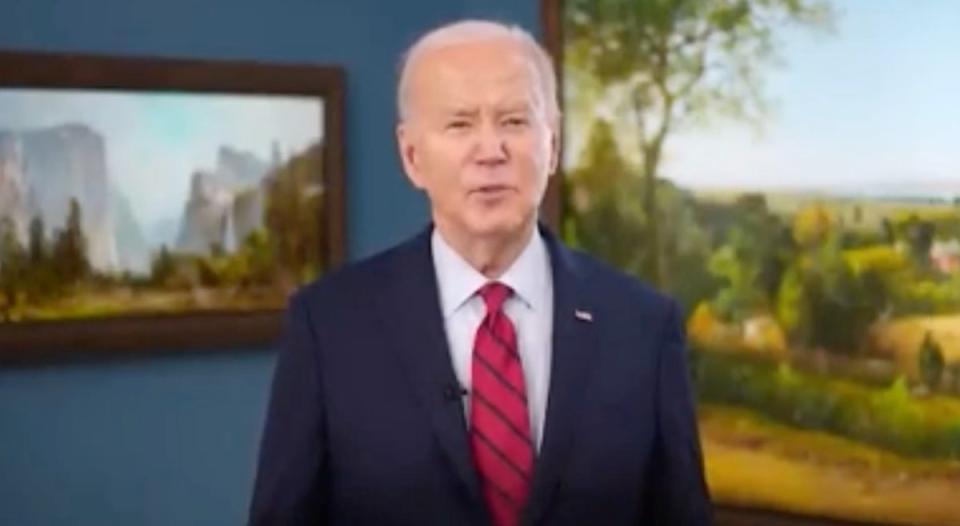Biden and Trump are ready to rumble at June debate. But it’s hardly a risk-free endeavor for either man
On Wednesday, President Joe Biden challenged former president Donald Trump to two debates with a few taunts and some social media sparring.
“I hear you’re free on Wednesdays,” the president said with a grin in a video clip, referencing the day each week when Mr Trump’s hush money trial is not in session in New York.
Trump responded in kind on his Truth Social social media platform and said he would be up for a debate.
“Crooked Joe Biden is the WORST debater I have ever faced – He can’t put two sentences together! Crooked is also the WORST President in the history of the United States, by far,” he said.
CNN had scheduled the first debate for June 10 and ABC will air the second debate on September 10.

The move upends the way presidental debates have been run for nearly 40 years. Since 1988, candidates have participated in debates run by the Commission on Presidential Debates. The decision also moves up the calendar for when people will have to pay attention, since debates usually happen from late September after both parties have held their conventions.
But Biden’s challenge, and Trump’s enthusiastic acceptance, reveals just how much both candidates need these debates in the short-term to convince an American public, weary of both men, that they are worthy of their vote.
For Biden, the reason to request the debates so early is obvious. Just this week, a New York Times/Siena College poll showed the president trailing Mr Trump in five out of six swing states.
As Inside Washington explained, the common refrain from Biden’s campaign whenever bad numbers come out is essentially, voters are not paying attention and once they realize the stakes of a Biden-Trump rematch, voters will “come home” and pick him. Polls also tend to show that Biden does better with likely voters than he does registered voters.
Biden needs to assuage questions and concerns about his age. As the oldest person to ever take office, Biden must do what he can to project an image that he is not only capable of doing the job, but that he is alert and listening to voters’ needs. Republicans have sought to hammer Biden’s age as a talking point.

In February, Special Counsel Robert Hur dropped a report regarding Biden’s handling of classified documents and while it did not recommend criminal charges, he described the president as a “well-meaning, elderly man with poor memory.”
A transcript of the full interview revealed Biden had a better memory than Hur depicted in the report. But Republicans, acting as Trump’s campaign arm in Congress, have treated this comment as their ace in the hole.
Biden’s debate decision also seeks to revive some of the energy he exerted in his forceful State of the Union address in March.
Despite his better stance in the polls, Trump needs a boost as well. While all Republican challengers officially dropped out two months ago, he continues to lose a significant chunk of voters in ongoing primaries to Nikki Haley.
It suggests that while Mr Trump faces no significant challenge for the GOP nomination, many Republicans - and possibly independents and Democrats in states with open primaries - feel the need to register their dissatisfaction.
The former president’s protracted legal battles - first in a civil defamation case brought by the writer E Jean Carroll and now in a criminal hush money trial - means he has not been able to visit swing states to rally the troops. The fact the race is still even competitive - a Fox News poll showed Trump and Biden neck-and-neck - despite Biden’s huge negatives is a testament to Trump’s weak candidate quality.
As a result, Trump needs to make a case for Republican voters to “come home”, that is, return back to the GOP fold and vote for him once again.
He must also remind Republicans who voted for Haley that he is the person who passed sweeping tax cuts for the wealthy and nominated three conservative Supreme Court justices who killed Roe v Wade.
In the same token, he also needs to convince swing voters that, despite low unemployment and higher wages, the economy during his presidency was better and he can bring them back to the days before the pandemic.
Of course, there are huge risks to moving up the debate calendar, and incumbent presidents don’t have a great track record in debates.
In 1984, Ronald Reagan stumbled verbally which some subsequently wondered was a sign of his future Alzheimer’s diagnosis. But Reagan later cracked a joke about his opponent’s inexperience and proceeded to blow out Walter Mondale in a landslide.
Eight years later, George H W Bush’s checking of his watch during a debate spelled the end for his campaign, making him seem aloof and inattentive to voters’ concerns.
Then there was Barack Obama’s meandering performance in 2012 which didn’t cost him the White House but did give Mitt Romney momentum until Biden, then Obama’s vice president, proceeded to joust with Romney’s running mate Paul Ryan and gave the campaign back its mojo.
Biden cannot afford a debate performance that confirms voters’ concerns about him.
Similarly, if Trump goes in too hot and interrupts Biden - which famously led to Biden exclaiming “will you shut up, man” in the first debate of 2020 - he might remind voters of how chaotic his presidency was and why they booted him in the first place.
Trump has also continued to attack Biden and say he will perform badly, which lower the bar for people to judge Biden.
But both men seem to have concluded that those risks are worth a potential early punch and drawing blood.
